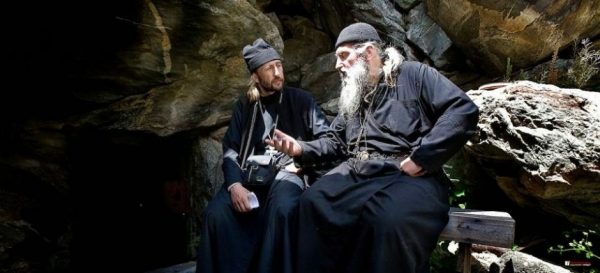In the letters of Sts. Barsanuphius and John, there is an interesting exchange between a young zealous monk and St. John (letters 503 – 570). In the first letter we find out that the young monk is upset with his spiritual father, who was also his cellmate, because he eats and sleeps too much. Apparently the spiritual father was eating three times a day, instead of once a day as was usual among desert monks. In addition, when the young monk would wake the older monk while saying his early morning prayers, the older monk would say, “Giving rest to one’s neighbour is a great virtue…” This young monk felt like the possibility of his spiritual growth was thwarted by the apparent laziness of his spiritual father.
St. John’s response is surprising. He first says that each person must eat what he needs, even if this means eating three times a day. And as far as sleep goes, St. John points out that there are two kinds of sleepiness: the sleepiness that comes from bodily weakness (referring probably to the spiritual father) and the sleepiness that comes from over-eating, leading to temptation to fornication (referring probably to the young monk).
Further, St. John points out that even if one does eat only once a day, but he eats without discernment, then such ascesis is of no benefit. “Without discernment” is a bit of a technical term. It means to do something, anything, without understanding how what you are doing is helping (or hindering) your relationship with God and with the people around you. Discernment is key to almost everything in the spiritual life. And the beginning of discernment is to realize that we are really bad at it.
One saying of the Desert Fathers is, “He who is his own spiritual father has a fool for a spiritual father.” And when we do have someone else as a spiritual father or mother, we gain no benefit if we are continually second guessing them. Ironically, in our foolishness, we think we are discerning, but we are really just puffed up with pride and don’t realize it. In the following letters, we find out that this younger monk’s real problems lay in his anger—often the underlying fuel for lustful thoughts. And anger often finds it’s ground in a “pretence to rights.” That is, we think we deserve something else, something bigger, better, easier, more spiritual, more important, more interesting, more this, less that. We think we have a right to be treated better, recognized, thanked and respected. And when our rights are ignored, we become angry.
This anger, however, is often hidden, as we are too proud to be honest. That is, we would be ashamed if others knew, even our spiritual father or mother, that we are not as humble as we want them to think we are. The inner anger and frustration then bursts out in unexpected places, often in thoughts of fornication. But there is a way forward.
St. John writes to this young monk that he must talk to his spiritual father “without turmoil [in his heart], but with humility and discernment.” Until he is able to do this, St. John gives this young monk a process by which he can begin to acquire humility and discernment. He tells the young monk that he is to do his best, “and no more.”
Those words, “and no more,” are the secret to the first steps in acquiring humility and discernment. Here’s the problem: We so often set ourselves up for failure by thinking our best must mean that we should do what someone else, probably a saint, is doing or has done. And so, without discernment, we force ourselves to complete a rigorous prayer rule or fasting discipline, or to sleep very little, or attend copious church services, or to volunteer at every opportunity—all without discernment, often motivated by a pride that thinks that all we have to do is force ourselves and we will attain the spiritual heights others seem to have attained.
How do we know if our asceticism is without discernment? Like this young monk, we start to judge the weakness of others. Judging others is a sure sign that our own asceticism may be without discernment. Or we find that trying harder only makes us more angry and fills our minds with turmoil so that we are too embarrassed or seem somehow unable to talk to our spiritual father or mother about it. When we find ourselves in this spot, I think the advice of St. John is very helpful. We must do our best, and no more. And we must accept that our best may be much less than we think it should be. This will be the beginning of the humility which will bring discernment.

















